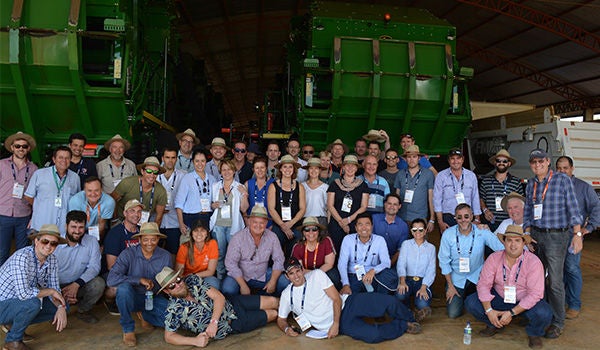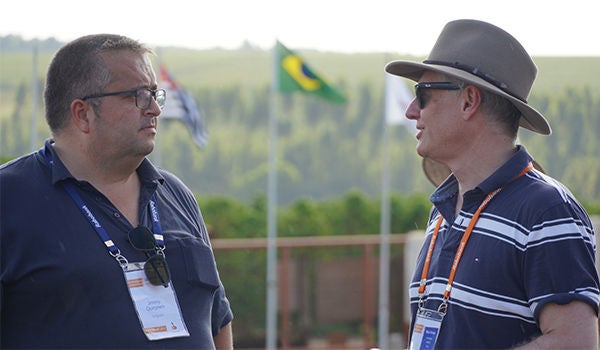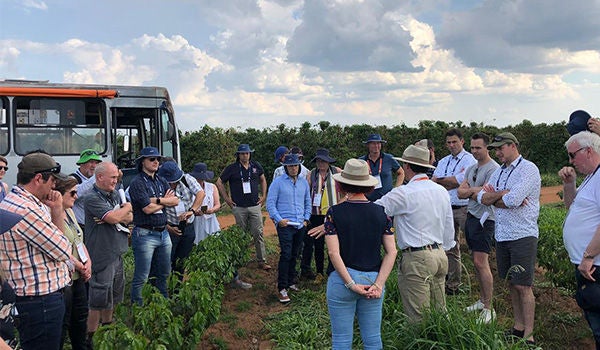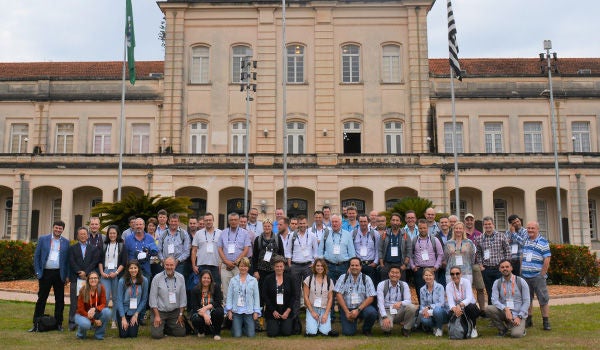Rabobank Global Farmers Masterclass Wraps Up In Brazil
Posted on
18/02/2020A group of 43 entrepreneurial farmers from 16 countries representing Rabobank and partner banks came together for an 11 day program focused on how to build a future-proofed farm business. The masterclass covered key areas like Strategy Development, Ag Tech and Innovation, Future Farming Models, Sustainability, Governance and Succession - topics which are top of mind for our farmers.

Currently in its 7th year, the Global Farmers Masterclass started in the Netherlands in 2012, and has since run in several countries including the Australia, New Zealand and Zambia, with over 250 leading farming clients taking part. As a cooperative bank invested to grow a secure food future for all, Rabobank has been uniquely placed at facilitating the Global Farmers Masterclass (GFMC) - bringing together a diverse group of farmers and producers from across the global supply chain.
Brazil was the perfect backdrop for the 2019 Master Class, being home to some of the largest farm businesses in the world and having transformed itself from a net importer of food, to a net exporting powerhouse within the past three decades. The masterclass kicked off in Sao Paulo, a region known for its diverse farming industries(including coffee, sugarcane, corn, beef, dairy and horticulture, amongst others) and finished in the state of Mato Grosso – renowned globally for its large scale commodity farming.
Mr. Wiebe Draijer, Chairman of the Rabobank Managing Board also joined the group, setting the scene by sharing his own insights about leadership and navigating an organisation through a period of change. He challenged the group to have an open mind and to explore new ideas and think outside the box to get the most out of the program, but also to take the plunge and not to let hesitation get in the way of connecting and collaborating with each other.
During the course, participants were invited to challenge themselves and improve their own business strategy with the guidance of professionals with significant experience in the food & agri industry – breaking down key issues facing their businesses and the industry at present and in the future. The main outcome being that every participant left Brazil with a tangible action plan to be used in discussions with their partners, family and relevant stakeholders once they returned home.

The program was also joined by Managing Board member Berry Marttin. Berry focused among other things on the importance of building global networks among farmers sharing the same passion and inspiring each other to overcome challenges, but also on the fact how little we actually know of the carbon implications of the future.
Sustainability, the current issues in the Amazon region, Future Proof Farming Models, the Future of Food, including the changing behaviour of the consumers were all topics that were on the table for discussion during the sessions. According to Nicholas Fereday, Executive Director of RaboResearch, farmers are in the midst of profound changes in consumer spending habits with an ever growing disconnect between farm and fork. While some family businesses have been focusing on differentiating their products in order to win consumers attention and increase business profitability.

It was agreed by participants that there is a need for concerted effort on ways agribusinesses can respond to changing consumer habits and needs i.e. plant based foods, sustainable farming, customising products according to the needs of the market. Moreover, farmers are not alone in facing these challenges. At the other end of the food system, food companies are also facing a similar challenges and looking to change with the times.
The sessions gave the participants a great deal to consider, especially on new opportunities like ‘premiumisation’ , added value product without which will inevitably lead to produce commoditisation and a price race to the bottom.
During the program, further challenges were discussed, including that of attracting and retaining the younger generation in the field. The seriousness of the problem was one that was shared by all participants and is an issue faced in most regions, like Japan, where the average age of farmer is 67.

The group agreed that the best way forward is to change the way they communicate with the up and coming generations – focusing on the positive impacts of farming – which requires a change in the language at home and in the community as well as investment in education and better planning around succession to sustainably grow their businesses as well as secure a strong food future for our communities.
For more information on how you can participate in upcoming Rabobank regional and local programs, speak to your local branch manager or contact us on 0800 500 933
You can read Nicholas Fereday’s latest talking points presented at the Brazil Master Class here.
The Farm Businesses Visited
The program got hands-on by visiting large scale farming businesses who are putting theory into practice across five regions in the States of Sao Paulo and Mato Grosso.
Terra Viva
A flower and vegetable producer and one of Rabo Brazil’s first clients - Terra Viva is an excellent example of adding value to its products by incentivising their co-workers (not called staff or employees!) to be innovative and creative in bringing new ideas and solutions to the table. Despite the fact that the company employs 1,200 people the hierarchy is still flat and decentralised, and all departments have their own mission and strategy, all built on strong governance and values. find out more at www.terraviva.agr.br
Agrindus
A dairy farm producing 22 million litres of milk annually, have developed their own brand Letti including Letti A2 milk, selling directly to supermarkets and via an internet platform directly to consumers in the large cities. An impressive example of adding value. find out more at www.maniadeleite.com.br
Labreda
Another great example of a strategy focused on quality, adding value and turning passion into a brand is a group of speciality coffees located in the city of Franca. The passion for this family business is also part of Flavia Lancha’s life, founder of Labareda. The group has several certifications and awards for its product, which is recognised in both local and international markets such as Japan and Australia.
Grupo Bom Futuro (GBM)
The group got to experience large scale farming first hand on their visit to Grupo Bom Futuro, one of the larger farmers in the north of Brazil - who have made perfect use of the commodity boom, new technology in seeds and farming practices. GBM grew from practically zero to now harvesting more than 500,000 ha annually due to double cropping practices – and planting up to 37,000 ha’s per day during the planting season. Find out more at www.bomfuturo.com.br/en-us
